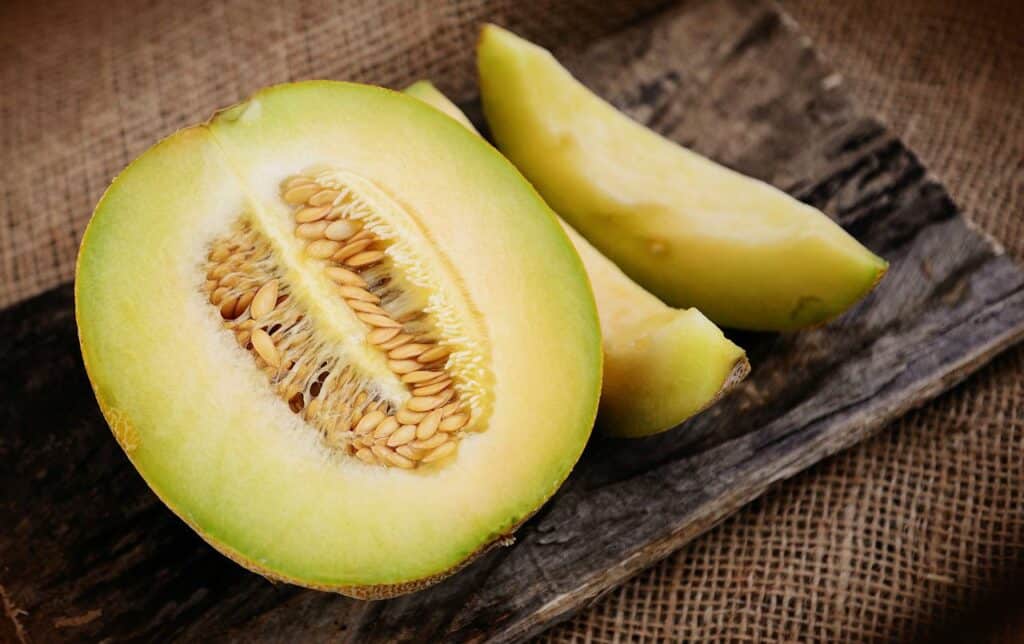If you are like me, you’ll agree that honeydew melons are delicious and nutritious, thanks to their vitamins, high water, and fiber content.
What’s not to love about their sweet, refreshing flavor anyway?
Notably, the flesh of the honeydew is perfectly safe for dogs to consume, but can the same be said about the rind?
Let’s find out.
So, can dogs eat honeydew melon rind?
Unfortunately, dogs cannot eat honeydew melon rind because it’s hard to digest and could cause an upset stomach or blockage.
The honeydew melon rind contains a compound called cucurbitacin E, which causes gastrointestinal upset in dogs.
If your dog does eat some by accident, keep an eye on them for any signs of gastrointestinal distress such as vomiting or diarrhea and contact your veterinarian if necessary.
As a loving dog parent, you want to give your furry friend the best of everything, including food.
This article will be discussing whether honeydew melon rind is safe for dogs to consume or not.
Read on to learn more about the risks involved with feeding your dog honeydew melon rind.

Risks of Honeydew Melon Rind to Dogs
Honeydew melon is a healthy fruit for dogs but not its rinds.
Giving your dog honeydew melon rinds exposes him to:
Choking Hazard
Honeydew melon rinds can be a choking hazard for dogs.
Although the rind may seem soft when touched, it can be challenging for your pup to chew and digest.
A large piece of honeydew melon rind can get stuck in a dog’s throat.
Consequently, the rind will cause choking as the dog struggles to swallow it.
The worst part is that the rind can block the dog’s airway, making breathing difficult.
Your dog may display the following signs when choking:
• Pawing at the mouth
• Drooling
• Difficulty breathing
• Panic
If you notice any of these signs, it’s essential to remove the honeydew melon rind from your dog’s throat as soon as possible.
Alternatively, take your pup to the emergency vet immediately.
Intestinal Blockage
The rind is fibrous and hard for dogs to digest.
If a dog ingests a large piece of the rind, it can cause an intestinal blockage.
This happens when the rind gets stuck in the intestines and prevents food from passing through.
Apart from preventing food passage, intestinal blockage obstructs efficient absorption and digestion.
This denies the dog essential nutrients needed for healthy growth.
Some symptoms of an intestinal blockage include:
• Vomiting
• Diarrhea
• Loss of appetite
• Bloating
If your dog ingests honeydew melon rind and displays any of these symptoms, take him to the vet immediately.
An intestinal blockage can be fatal if not treated promptly.
Alpha-Galactosidase Poisoning
Honeydew melon rinds contain a toxin called alpha-galactosidase.
This substance is harmless to humans but can be poisonous to dogs.
When ingested, the toxin prevents the breakdown of carbohydrates in the stomach.
As a result, gas accumulates in the intestines, leading to bloating and abdominal pain.
Your dog may also experience vomiting and diarrhea when he ingests alpha-galactosidase.
Treatment for Alpha-Galactosidase Poisoning
If you think your dog has ingested honeydew melon rinds, take him to the emergency vet immediately.
The vet will give your pup an injection to stop the toxin from being absorbed into the intestines.
Your dog will also be given IV fluids to prevent dehydration.

Preventing Your Dog from Eating Honeydew Melon Rind
Our dogs depend on us for provision and care.
Therefore, they will eat anything we give them.
It’s your responsibility to ensure your pup consumes only healthy and nutritious food.
You can prevent your furry friend from eating honeydew melon rinds by:
• Disposing of the rinds properly in a garbage can
• Keeping your dog away from the garbage can
• Not feeding your pup honeydew melon rinds intentionally
Some dogs are known to rummage through trash in search of food.
Therefore, you’ll avoid any accidental ingestion by disposing of the rinds properly.
How to Prepare Honeydew Melon for Your Dog
Honeydew melon is a nutritious fruit for dogs.
Only the rinds and seeds are toxic.
When prepared well, the fruit contains the following nutrients needed by your dog:
- Dietary fiber
- Thiamine
- Niacin
- Vitamin C
- Potassium
The following is the procedure to prepare honeydew melon for your furry friend safely:
- Cut the honeydew melon in half
- Cut off the rinds and remove the seeds
- Chop the melon into small pieces or blend it to form a puree
- Give your pup a small amount of honeydew melon as a treat
Do not give your pup excessive honeydew melon.
The fruit is high in sugar and dietary fiber, which can harm your dog if consumed excessively.
Too much dietary fiber can cause gastrointestinal upset, while sugar is a recipe for diabetes and weight gain.
Safe Alternatives to Honeydew Melon Rind
There are many safe alternatives to honeydew melon rinds for dogs.
The following are some of the best options:
- Leafy greens: Spinach, kale, and romaine lettuce are some of the best leafy greens for dogs. These vegetables contain vitamins needed for a dog’s growth and development.
- Fruits: Watermelons, blueberries, strawberries, and bananas are some of the safest fruits for dogs. These fruits contain vitamins, minerals, antioxidants, and fiber which are beneficial for your pup’s health.
- Vegetables: Carrots, green beans, and cabbage are some of the best vegetables for dogs. These vegetables contain vitamins, minerals, antioxidants, and fiber for your pup’s health.
Frequently Asked Questions
Can dogs eat honeydew melon rind in moderation?
No, dogs should not eat honeydew melon rind in moderation.
Apart from choking, the rinds can block a dog’s intestines and prevent food from passing through.
Can pregnant dogs eat honeydew melon rinds?
No, pregnant dogs should not eat honeydew melon rinds.
The toxin in the rinds can be passed to the puppies and kill them.
Furthermore, they can pose a choking hazard to dogs.
The Bottom Line
Honeydew melon is a healthy and delicious fruit for dogs.
However, the rinds can be dangerous and even fatal if ingested.
It’s essential to dispose of the rinds properly to prevent your pup from eating them.
If your dog has eaten honeydew melon rinds, immediately take him to the emergency vet.
The vet will give your pup an injection to stop the toxin from being absorbed into the intestines.
If you must give your dog honeydew melon, ensure to remove the rind and seeds.
These are the only toxic parts of the melon to dogs.
- What Dog Breeds Have Pink Skin? - March 24, 2023
- What Are the Most Inspiring Dog Breeding Quotes? - March 20, 2023
- Can Pheromone Spray Help Improve Dog Breeding Results? - March 19, 2023








